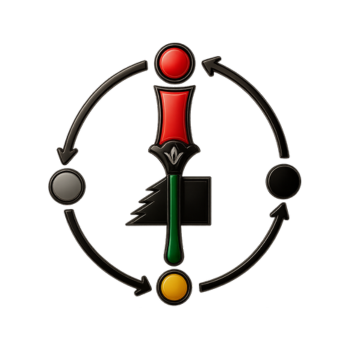-
The flag is highly significant in the Afrikan spiritual system because it symbolises the connections among human beings and so helps to connect human beings to each other to form communities. It serves as a marker of remembrance and love and it connects and unites into one community all humans of a particular familial, spiritual, social, political or even military groups: those past (ancestors), those living (who are in this dimension of time), and those who are yet to come (the unborn). The flag may also connect the members of a community to divinity because, as the divine symbol of a particular community (a family, a clan or a nation), it may also recall and represent a founding ancestor, although it may also represent an animal or an aobject that equally may embody the principles, vital forces, or soul of the community in question.
The fundamental understanding that instruct especially flag planting are the interrelation of all beings and things in the cosmos and, as a consequence, the critical importance of humans maintaining their connections with these forces, especially the Creator, their ancestors, with the living and the unborn and with the environment in which they live. Today flags are regularly planted in special rituals and ceremonies held within an Afrikan spiritual system. They are considered symbolic especially to particular social and religious groups and may even be held as sacred to some. Flags, standards, ensigns, pennants and streamers are not always one and the same thing. Strictly speaking , a flag is a piece of cloth that is flown attached to a pole. It’s colour and/or the representation on it of an animal , a place or an idea, or any combination of these may signify that it represents a particular group of people who have a special relationship to what is depicted. Sometimes one or more long, thin pieces of cloth are attached to the flagpole, mostly below the flag. These are called “streamers”.
If flown on their own (without a flag), they may be referred to as “pennants” and may carry an emblem. Many Afrikan families and clans, sometimes occupying entire communities and even districts, take their family names from the ancestral person or the sacred animal or object represented and recalled in the emblem and displayed on the flag. The members of a particular group do not eat their representative animal or a particular part of it. If the representative thing is an object, then it must be avoided. Each of these representative animals and objects is taboo to those it represents. The penalty for not respecting this rule may be illness or some other form of punishment to someone, not necessarily the one who made the infraction, but one related to him or her. The practices of species protection, without borders, and of environmentalism in general that were instructed by this worldview are of tremendous importance.
1 Comment-
Identity within the coummnity is so powerful and grounding!
-

